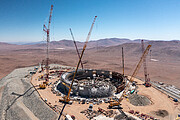Mitteilung
Neuer Bericht stellt Empfehlungen für den künftigen Kurs der europäischen Astronomie vor
3. Mai 2023
Ein internationales Konsortium führender Astronom*innen, zu denen auch ESO-Mitarbeiter*innen gehören, hat einen neuen Bericht mit Empfehlungen vorgestellt, die unser Verständnis des Universums im nächsten Jahrzehnt transformieren können.
Die ASTRONET Science Vision and Infrastructure Roadmap 2022-2035 ist die neuste umfassende Roadmap des ASTRONET-Netzwerks der europäischen Förderungseinrichtungen, -gemeinschaften und Forschungsorganisationen.
Die Roadmap definiert die wichtigsten Prioritäten, wie z. B. das Verständnis des Ursprungs des Universums und der Entwicklung der Planeten in unserem Sonnensystem, und gibt Empfehlungen zu den Einrichtungen und Ressourcen, die zur Erfüllung dieser Prioritäten erforderlich sind. Eine kontinuierliche Verfügbarkeit gut ausgebildeter und motivierter Forscher wird ebenfalls von grundlegender Bedeutung für den Fortschritt und das gesellschaftliche Engagement sein.
Unter den wichtigsten vorgeschlagenen europäischen Investitionen, zu denen das Einstein Telescope (ein Gravitationswellen-Observatorium) und das European Solar Telescope gehören, nennt der neue Bericht, dass „die Fertigstellung und Inbetriebnahme des Extremely Large Telescope (ELT) der ESO und seiner Instrumente der ersten Generation (...) von zentraler strategischer Bedeutung sind“. Außerdem wird das Cherenkov Telescope Array (CTA) als strategische Priorität für die bodengebundene Astronomie hervorgehoben. Die ESO ist Teil des CTA-Observatoriums, der Organisation, die das CTA betreibt, und wird die Anlage auf der Südhalbkugel der Erde am Paranal-Observatorium der ESO in Chile beherbergen.
Weiterhin unterstreicht der Bericht die Wichtigkeit von kontinuierlichen Investitionen in den Ausbau und die Erweiterungen von zahlreichen Projekten, die mit der ESO in Verbindung stehen, insbesondere der Ausbau des Atacama Large Millimeter/submillimeter Array (ALMA) und der Entwicklung von neuen Instrumenten für das Very Large Telescope und Very Large Telescope Interferometer der ESO.
Zusätzlich verdeutlicht der Bericht die Nachhaltigkeit und Barrierefreiheit als wichtige Prioritäten für die europäische Astronomie und betont, wie wichtig es ist, die positiven Auswirkungen der Astronomie auf die Gesellschaft zu fördern, in Einklang mit den Bemühungen der ESO in diesen Bereichen.
Ziel des ASTRONET-Berichts ist es, eine offen zugängliche Ressource für politische Entscheidungsträger und Wissenschaftsführer zu schaffen, um fundierte Entscheidungen zu unterstützen, die die wissenschaftliche Forschung effektiver und effizienter gestalten.
ASTRONET ist ein unabhängiges Konsortium, dessen Ziel es ist, eine gemeinsame wissenschaftliche Vision für die gesamte europäische Astronomie zu schaffen, indem es diverse Gruppen zusammenbringt, um die Herausforderungen zu beschreiben, denen wir bei einigen der größten Fragen der Wissenschaft begegnen.
Mehr als 100 Wissenschaftler*innen aus ganz Europa haben an der Erstellung des Berichts mitgewirkt, und es wurde eine Reihe öffentlicher Konsultationen durchgeführt, um sicherzustellen, dass der Bericht die Vielfalt der Ansichten innerhalb der Astronomie widerspiegelt.
Die vorherige ASTRONET Science Vision and Infrastructure Roadmap (2007 veröffentlicht und 2015 überarbeitet) enthielt Empfehlungen, die in Vorschläge für weltberühmte wissenschaftliche Infrastrukturen wie das ELT und das Square Kilometre Array Observatory (SKAO) einflossen.
Den vollständigen Berichten finden Sie auf der Astronet-Webseite.
Weitere Informationen
ASTRONET wurde 2005 als Konsortium europäischer Förderorganisationen und Forschungseinrichtungen gegründet (ESO, ESA und SKAO sind an seiner Arbeit beteiligt). Eines seiner Hauptziele ist die Erstellung eines strategischen Plans und einer Infrastruktur-Roadmap sowie die Förderung der Annahme der Empfehlungen der Roadmap.
ASTRONET war bis 2015 ein EU-finanziertes ERA-NET im Rahmen von HORIZON 2020 und mit Unterstützung der Europäischen Kommission. Inzwischen ist es eine sich selbst verwaltende Gruppe von Förderorganisationen und assoziierten Einrichtungen. ASTRONET ist bestrebt, alle astronomischen Bereiche zu berücksichtigen: von der Sonne und unserem Sonnensystem bis zu den Grenzen des Universums. Die Forschung wird durch Studien mit Hilfe bodengebundenen Einrichtungen und Weltraumbeobachtungen sowie durch Theorie, Laborastrophysik und Computertechnik vorangetrieben.
Links
Kontaktinformationen
Bárbara Ferreira
ESO Media Manager
Garching bei München
Tel: +49 89 3200 6670
E-Mail: press@eso.org
Über die Mitteilung
| ID: | ann23005 |

